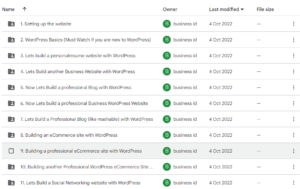
Udemy WordPress Free Course
Table of Contents
ToggleUnlocking the Full Potential of Your WordPress Website: A Comprehensive Guide
I. Introduction
- A brief overview of WordPress and its popularity
- Why having a powerful website is crucial for businesses and individuals
II. Getting Started with WordPress
- Understanding the basics of WordPress
- Choosing between WordPress.com and WordPress.org
- Setting up a domain and hosting
- Installing WordPress
III. Navigating the WordPress Dashboard
- Exploring the WordPress dashboard interface
- Customizing the dashboard for optimal productivity
IV. Choosing the Right Theme
- Importance of selecting a suitable theme
- Exploring the different types of themes available
- Factors to consider when choosing a theme
- Installing and activating a theme
V. Configuring Essential Settings
- Understanding and customizing the general settings
- Managing user roles and permissions
- Configuring discussion and commenting settings
- Setting up permalinks for search engine optimization (SEO)
VI. Creating Engaging Content
- Planning and organizing your content strategy
- Creating and publishing blog posts and pages
- Utilizing categories and tags effectively
- Incorporating multimedia elements into your content
VII. Enhancing Functionality with Plugins
- Introduction to plugins and their benefits
- Must-have plugins for security and performance optimization
- Popular plugins for SEO, social media integration, and analytics
- Installing and managing plugins
VIII. Customizing Your Website with Widgets
- Understanding the role of widgets in WordPress
- Adding, removing, and rearranging widgets
- Exploring useful widget options for different website components
IX. Optimizing Your Website for Search Engines
- Importance of search engine optimization (SEO)
- Implementing basic on-page SEO techniques
- Optimizing images and media for better visibility
- Utilizing SEO plugins and tools
X. Implementing E-commerce Functionality
- Exploring e-commerce options with WordPress
- Setting up and managing an online store
- Integrating payment gateways and shopping carts
- Enhancing the shopping experience with plugins

XI. Securing Your WordPress Website
- Understanding common security risks
- Implementing strong user authentication measures
- Regularly updating WordPress and plugins
- Utilizing security plugins and monitoring tools
XII. Monitoring Website Performance
- Importance of website performance optimization
- Analyzing website speed and identifying bottlenecks
- Caching techniques and content delivery networks (CDNs)
- Monitoring and improving website uptime
XIII. Implementing Accessibility Best Practices
- Understanding web accessibility standards
- Making your website accessible for all users
- Testing and optimizing accessibility features
XIV. Managing User Interaction and Engagement
- Encouraging user interaction through comments and feedback
- Implementing social sharing features
- Managing user registrations and memberships
XV. Backing Up and Restoring Your Website
- Importance of regular website backups
- Choosing a reliable backup solution
- Restoring your website from a backup
XVI. Scaling and Growing Your WordPress Website
- Strategies for handling increased traffic
- Scaling your hosting infrastructure
- Optimizing performance for high-traffic scenarios
- Expanding functionality with advanced plugins and themes
XVII. Conclusion
- A recap of the guide’s key points
- Emphasizing the importance of ongoing website maintenance and improvement
XVIII. FAQs
- How much does WordPress cost?
- Does WordPress.com allow me to use my own domain name?
- How do I install a WordPress theme?
- Are there any free plugins available for WordPress?
- How can I make my WordPress website load more quickly?
- Can I sell products on my WordPress website?
- How can I protect my WordPress website?
- What are the best practices for website accessibility in WordPress?
- What happens if my website crashes? Can I recover it?
- How can I scale my WordPress website to handle high traffic?
XVIII. FAQs
- How much does WordPress cost?
- WordPress itself is free and open-source software. However, you will need to pay for a domain name and hosting, which typically range from a few dollars per month to higher-tier plans for advanced features and performance.
- Does WordPress.com allow me to use my own domain name?
- Yes, WordPress.com offers the option to use your own custom domain name. This allows you to have a professional web address that aligns with your brand or personal identity.
- How do I install a WordPress theme?
- Installing a WordPress theme is a straightforward process. Click the “Add New” button under “Appearance” > “Themes” in your WordPress dashboard. You can then search for free themes from the WordPress theme directory or upload a premium theme in ZIP format. Once you find the desired theme, click “Install” and then “Activate” to make it live on your website.
- Are there any free plugins available for WordPress?
- Yes, the WordPress plugin repository offers thousands of free plugins for various purposes, including SEO optimization, contact forms, security enhancements, and more. You can access and install these plugins directly from your WordPress dashboard.
- How can I make my WordPress website load more quickly?
- There are several ways to improve the loading speed of your WordPress website. Start by optimizing images and media files, using caching plugins, minimizing CSS and JavaScript files, and choosing a reliable and fast hosting provider. Additionally, consider implementing a content delivery network (CDN) and regularly updating your WordPress installation and plugins to ensure optimal performance.
- Can I sell products on my WordPress website?
- Yes, WordPress provides robust e-commerce solutions through plugins such as WooCommerce. With WooCommerce, you can set up an online store, manage products, process payments, and handle inventory. It offers flexibility and customization options to suit various business models.
- How can I protect my WordPress website?
- Securing your WordPress website involves several measures. Start by using strong, unique passwords and enabling two-factor authentication for user accounts. Regularly update WordPress core, themes, and plugins to patch any security vulnerabilities. Install a security plugin to enhance protection, enable a website firewall, and implement secure hosting practices. Regularly back up your website to ensure data recovery in case of an attack.
- What are the best practices for website accessibility in WordPress?
- To ensure website accessibility, use an accessible theme that follows web standards, provides proper headings and navigation, and offers alternative text for images. Implement proper color contrast, offer keyboard navigation, and provide captions for multimedia content. Regularly test your website with accessibility tools and involve users with disabilities for feedback and improvement.
- What happens if my website crashes? Can I recover it?
- If your website crashes, you can recover it by restoring a backup. It’s crucial to regularly back up your WordPress website using reliable backup plugins or hosting provider features. In case of a crash, you can restore your website to a previous working state by following the backup restoration process provided by your backup solution.
- How can I scale my WordPress website to handle high traffic?
- Scaling a WordPress website involves optimizing your hosting infrastructure, implementing caching techniques, and using content delivery networks (CDNs). You can also optimize your website’s code and database, leverage caching plugins, and utilize server-level caching. Consider using a scalable hosting solution or upgrading your hosting plan to handle increased traffic demands.

XIX. Monetizing Your WordPress Website
Creating a WordPress website not only allows you to establish your online presence but also opens up opportunities to generate revenue. Here are some ways you can earn from your WordPress website:
- Display Advertising: Display advertising is one of the most popular forms of website monetization. Join advertising networks such as Google AdSense or Media.net, and place ads on your website. You earn revenue when visitors click on or view these ads.
- Affiliate marketing: Affiliate marketing involves joining affiliate networks that are relevant to your market and promoting goods and services using distinctive affiliate links. When visitors make a purchase through your referral, you earn a commission. Incorporate affiliate links into your content or utilize banners and promotional materials provided by the affiliate programs.
- Sponsored Content: Collaborate with brands or businesses in your industry and publish sponsored content on your website. This can include sponsored blog posts, product reviews, or dedicated advertising sections. Ensure transparency by clearly marking sponsored content as such.
- Digital Products: Create and sell digital products directly on your WordPress website. These can include e-books, online courses, premium plugins or themes, photography or artwork, music, or any other digital content that aligns with your expertise and target audience.
- Membership or Subscription Model: Offer premium content or exclusive access to members or subscribers. Create a membership site where users pay a recurring fee to access specialized content, forums, or community features. Use plugins like MemberPress or Restrict Content Pro to manage subscriptions.
- Freelancing or Consulting Services: If you have expertise in a specific field, utilize your website to promote your freelance or consulting services. Showcase your skills, experience, and portfolio to attract potential clients and secure paid projects or consulting gigs.
- Selling Physical Products: If you have physical products to sell, set up an online store using e-commerce plugins like WooCommerce. Manage inventory, process payments, and offer shipping options to sell products directly to your audience.
- Donations: Offer the option for visitors to support your website through voluntary donations. Use platforms like PayPal or Patreon to collect donations from grateful users who appreciate the value you provide.
- Events and Workshops: Organize and promote events, workshops, or webinars related to your niche. Offer tickets or registrations through your website, providing valuable educational or networking opportunities for participants.
- Sponsored Reviews or Partnerships: Collaborate with brands for sponsored reviews or partnerships. Provide honest and unbiased reviews of products or services relevant to your audience, and earn compensation or receive free products or services in return.
Remember, successful monetization requires a strategic approach, quality content, and an understanding of your audience’s needs and preferences. Experiment with different methods and assess their effectiveness to determine the most suitable monetization strategy for your WordPress website.

ACCESS THE PAID COURSE FOR FREE
YOU CAN ALSO GET A BLOGGING COURSE


